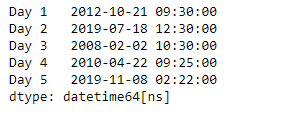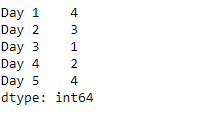Python Pandas Series.dt.nanosecond
Series.dt可以用来访问系列的数据时间的值,并返回几个属性。Pandas Series.dt.nanosecond属性返回一个numpy数组,包含给定系列对象底层数据中的日期时间的纳秒。
语法: Series.dt.nanosecond
参数:无
返回 : numpy数组
示例#1:使用Series.dt.nanosecond属性来返回给定Series对象的基础数据中的日期时间的纳秒。
# importing pandas as pd
import pandas as pd
# Creating the Series
sr = pd.Series(pd.date_range('2012-12-12 12:12', periods = 5, freq = '5N'))
# Creating the index
idx = ['Day 1', 'Day 2', 'Day 3', 'Day 4', 'Day 5']
# set the index
sr.index = idx
# Print the series
print(sr)
输出 :

现在我们将使用Series.dt.nanosecond属性来返回给定Series对象的基础数据中的日期时间的纳秒。
# return the nanosecond
result = sr.dt.nanosecond
# print the result
print(result)
输出 :

正如我们在输出中看到的,Series.dt.nanosecond属性已经成功访问并返回了给定系列对象的底层数据中的日期时间的纳秒。
示例#2 :使用Series.dt.nanosecond属性来返回给定Series对象的基础数据中的日期时间的纳秒。
# importing pandas as pd
import pandas as pd
# Creating the Series
sr = pd.Series(pd.date_range('2008-2-9 08:20:21',
periods = 5, freq = '9N'))
# Creating the index
idx = ['Day 1', 'Day 2', 'Day 3', 'Day 4', 'Day 5']
# set the index
sr.index = idx
# Print the series
print(sr)
输出 :
现在我们将使用Series.dt.nanosecond属性来返回给定Series对象的基础数据中的日期时间的纳秒。
# return the nanosecond
result = sr.dt.nanosecond
# print the result
print(result)
输出 :

正如我们在输出中看到的,Series.dt.nanosecond属性已经成功访问并返回了给定系列对象的底层数据中的日期时间的纳秒。
 极客教程
极客教程